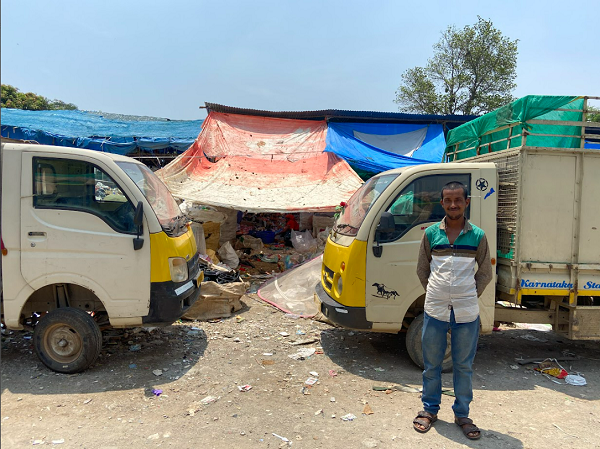Sanjab Ali is a man with a radiant everlasting smile. He is the owner of the Sanjab Ali van unit godown in Begur, Bengaluru.
Sanjab arrived in Bengaluru 10 years ago with a friend. While his friend took up a security job, he found the repeated opening and closing of doors rather tedious, leading him to believe that it was not his cup of tea and he could do more.
Nevertheless he settled down in Bengaluru finding to his liking the people, weather and the food. The first few years Sanjab spent picking up waste from roads on his cycle . About 2 years ago he met a person from BBMP. They told him that they had waste work for him and if he had a godown and a vehicle, then he could take it up.
“So I rented a vehicle. Paid a monthly 15k rent. Made a small godown. And then began sorting. Then I met a guy from HDI. I connected with Arif. Then they gave me their office address and went there and it happened!“
For context, Arif is the Head of Operations for the flagship service of Circular Waste Management by Hasiru Dala Innovations. Under the service, HDI, signs yearly contracts with bulk generators of waste, such as apartments, villas and corporate premises for responsible waste management. It then gives access to these premises for primary waste collection to waste picker entrepreneurs such as Sanjab Ali who choose to work with HDI. So from picking up waste from the roads, which makes the livelihood uncertain, the waste pickers now get access to clean waste from source.
Now Sanjab’s job entails supervising his employees as they sort through waste. Waste no longer has to be searched for, it is picked up from apartments contracted through HDI in trucks and brought directly to his godown.
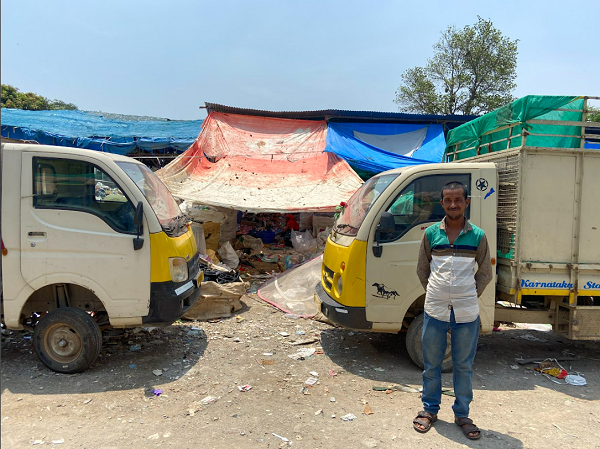
Sanjab Ali with the trucks that he owns
Sanjab Ali provides employment for 15 workers, allowing them to sustain their livelihoods.
Workers sort the dry waste into different categories. At the end of each day, each segregated category is weighed and the worker is paid accordingly. Different categories have different rates and these rates fluctuate based on demand. The workers get predictable incomes even with these fluctuations, Sanjab mentions proudly.
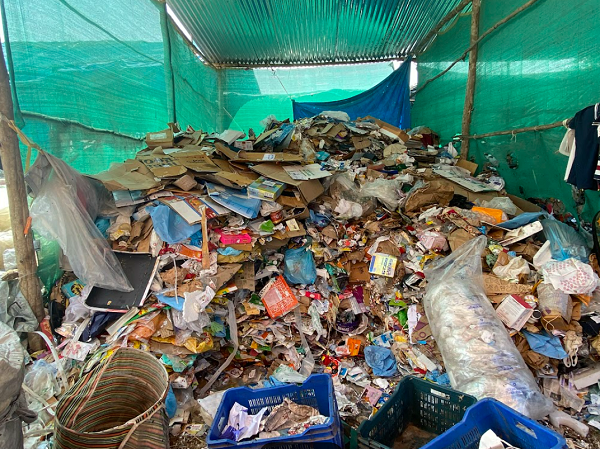
Unsegregated Dry Waste as Collected from Bulk Waste Generators
During the sorting process, the workers occasionally come across items such as hair, printer cartridges, or empty scent bottles. By selling these items, they are able to earn an incentive of about 150 or 200 Rs. Sanjab does not interfere in these transactions. He says the unexpected discovery of these materials brings to them joy and serves as a motivating factor for the workers, leading to increased productivity as they strive to uncover more such valuable items.
“My workers are from Assam. Some are friends and relatives and there are people outside of this also. I do not know how they (the workers) get my number, they somehow hear that this is a good place to work from people that already work here and slowly our family grows.”
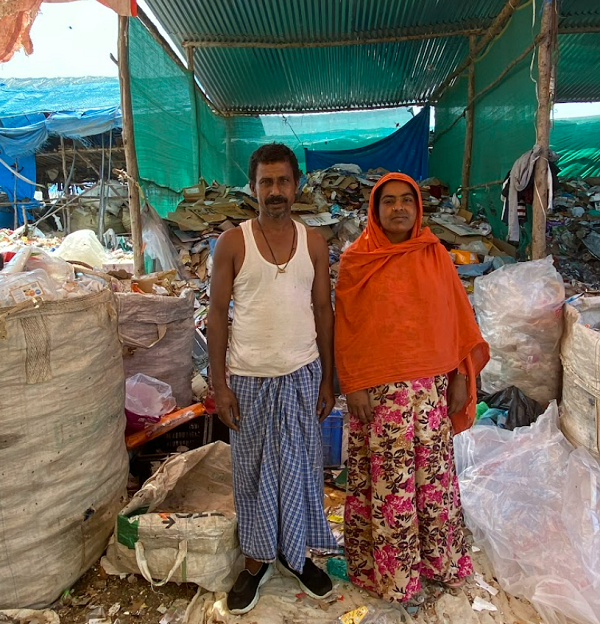
Ohap and his wife who are involved in the sorting of waste. Ohap used to collect mud from the rivers in Assam before it was banned by the government, making him lose his means of livelihood
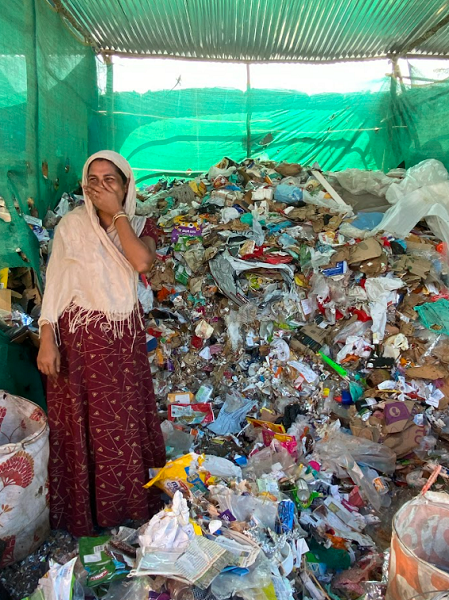
Abhidha Khatul, a jovial worker who works on the site with her husband. She is ready to teach you phrases in her language on demand.
Evenings are spent hanging around, talking and sometimes doing calculations of the waste that is collected and how much money is made.
“They are like my family”, he says referring to his workers. “Just like their parents raised them, I too look after their needs away from home; we share our happiness, sadness, and support each other in sickness. If they are short on money, we help them.”
From the godown, the segregated waste material is sent in trucks to dealers. At this stage,the material is baled and made into granules, he explains showing his proficiency in his work.
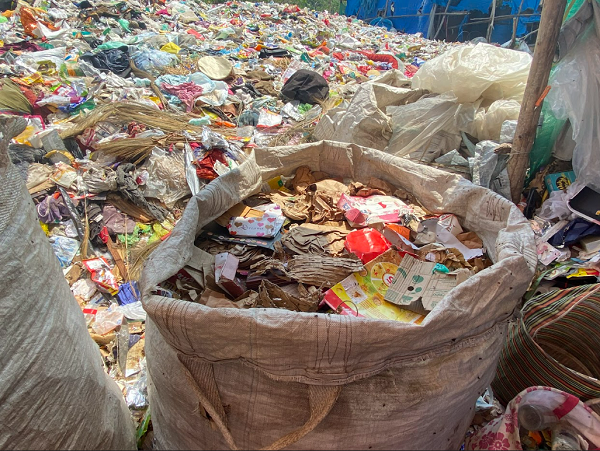
Paper Waste
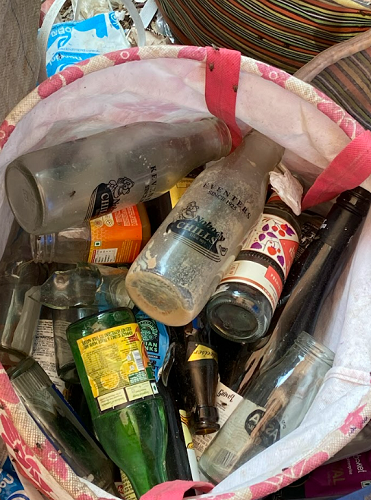
Glass bottles
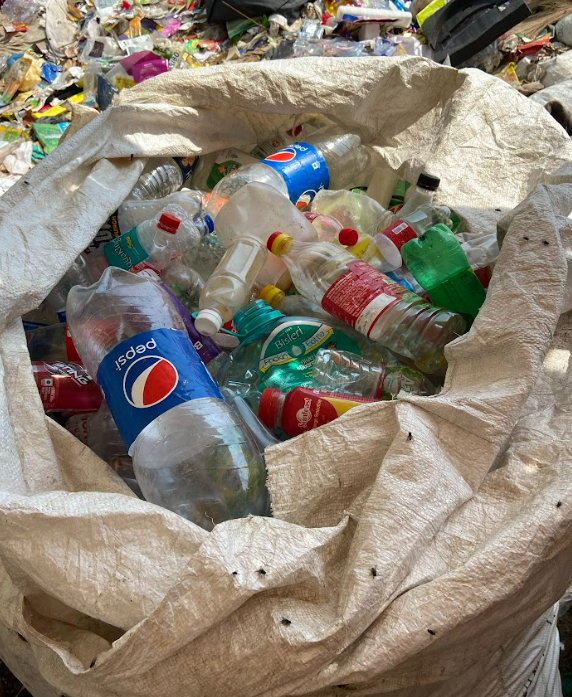
Plastic Bottle Waste
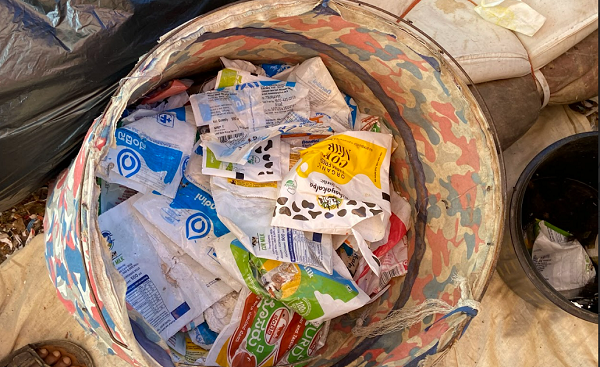
Milk Packets
Sanjab lives in the facility with his wife and has 4 children. Two of them live with his parents in Assam and are studying there while the 2 younger ones , aged 1.5 years and 2 years, live with him and his wife.
“When they grow up, we plan to educate them here. There is quite a lot of difference between education in my village and here. Here little children talk in English. I want them to learn English”, he says.
He feels education is their way forward. Says Sanjab Ail:
“We somehow landed in waste, we don’t want the children to spend their lives in this. I want them to grow up to be engineers and doctors. “
When asked what made him choose waste picking Sanjab says decidedly,
“I get to do things my way. I do not have fixed working hours, it offers me flexibility. Like how people do farming, it is the same. I have my own place and can work at my convenience. There’s no one on top of my head whipping me to work. ”
Working with HDI has not imposed upon his freedom, says Sanjab,
“It is better than before. I had a cycle before, now I have a vehicle. I got to build my godown space because of them, and got more sorters to work with me. It is in a much better condition than before. ”
Sanjab and his workers do not take a day off, for the city doesn’t stop generating waste. Each and every day is spent collecting and sorting waste. Amidst their relentless efforts, Sanjab enthusiastically shares his aspirations for his business. He expresses his desire to grow further, get more work from HDI, expand his godown, and acquire his own baling machine.
There are between 15 lakh and 40 lakh1 informal waste pickers in the country. Issues such a migration to urban areas, lack of employment opportunities, and the lack of education, make migrants choose waste picking as a livelihood; besides other reasons such as those cited by Sanjab about work flexibility. Many women waste pickers in fact choose waste picking so that they can collect waste early in the morning, sell it in a scrap shop and then do other jobs during the course of the day.
They form part of the informal sector, which collects the majority of the bulk of waste. Collection of waste is the first step in recycling. Waste pickers collect and sort recyclable waste from the bulk of our dry waste and sell it to the relevant channel, from where it would go back into the economic value chain. They are therefore the first-mile contributors to a circular economy.
Despite recovering up to 58% of recycled waste globally, people working in this sector remain trapped in poverty.2 Newer startups in the waste management space are implementing models that displace waste pickers, and deny them access to clean waste. With India’s waste management market project to be worth 14 billion by 2025, the sector is inviting entrepreneurs with new innovation in the space, with little knowledge about the work being existingly done in the sector. As a result, waste pickers, instead of being integrated into these solutions, are being displaced from their existing employment by denial of access to clean waste from source.
Collaborative efforts and business models that understand and incorporate a Just Transition to climate change efforts must come into action. According to UNEP, a just transition towards a circular economy for plastics could be defined as the process of designing, promoting, and implementing actions to transition to sustainable production and consumption of plastics in a manner that is fair and inclusive of everyone concerned, including waste pickers and other workers in the plastics value chain, creating decent work opportunities and leaving no one behind.
At Hasiru Dala Innovations, our core ethos is that of Inclusive CircularityTM, the deliberate & planned inclusion of waste pickers as an integral part of the evolving circular economy value chain. We envision a world with no waste and no waste pickers, where waste is an endless resource and waste pickers have transitioned to being green professionals, with capacities built for responsibly handling waste.
Hopefully Sanjab Ali’s story gives you an insight into the informal waste world and inspires you to know more about the waste picker community.
Written by ~ Laya Lakshminarayanan
Edited by ~ Shekar Prabhakar, Vividha Vyas
- https://idronline.org/article/livelihoods/is-there-a-role-for-informal-waste-pickers-in-the-new-waste-economy/
- United Nations (2022). The Sustainable Development Goals Report 2022, p. 49.
- https://idronline.org/article/livelihoods/is-there-a-role-for-informal-waste-pickers-in-the-new-waste-economy/
